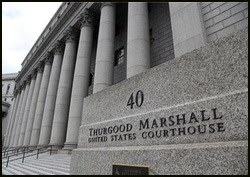
Oral Argument in the second appeal in our long-running Federal civil rights lawsuit against New York City and District Attorney Cyrus Vance, Jr. was held yesterday. The three-judge panel included two judges who sat on the first appeal which we won unanimously.
All three judges asked questions indicating they understood the case, which is always a good place from which to start. Plaintiffs’ attorney, Daniel Schmutter with Hartman & Winnicki, P.C., did a great job explaining how the District Court judge, in ruling against us, had fundamentally re-characterized the case in a way that did not reflect the case presented.
Click here to listen to the Oral Argument hearing.
The key issue in the case, as was explained by Schmutter, is that there is no way anyone can tell if their knife is legal and no way for them to determine that they will not be subject to arrest and criminal prosecution. Under the City’s vague and subjective “wrist flick test,” also referred to as the “functional test,” it is impossible to know what knives will be treated as legal. He reminded the judges of testimony from Assistant District Attorney Dan Rather, Jr,. who stated on the stand that a consumer could test a knife twice using the “wrist flick” maneuver in a retail store and if it did not open then it was not an illegal gravity knife. However, Rather also testified the he could be arrested immediately upon exiting if a New York City Police officer stopped that same customer and was able to “wrist flick” it open.
The City’s and District Attorney’s lawyers argued the same misleading and irrelevant positions as before. They carefully ignored the facts and this key issue of the case as demonstrated by Rather’s testimony. It was all smoke and mirrors. The reality is that nobody in New York can know that their knife is legal because the “wrist flick test” is indeterminate and variable between persons doing the test. It is therefore unconstitutionally void for vagueness.
A decision is likely six to nine months away. The decision in our first appeal took eight months.

